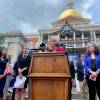The patchwork of abortion laws across the United States means that where a person lives has an outsized effect on the services they can access. Even in Massachusetts — which for years had wide access to abortion and, in 2020, passed the ROE Act to codify those rights into law — patients and practitioners say getting an abortion has not always been an easy process. Recent and pending legislation at the state level aims to expand access in the commonwealth.
Amid the historic debate about the future of reproductive rights, GBH News spoke with four people about their experiences with abortion in Massachusetts, the barriers they faced and how it feels to see abortion rights rolled back across the country. Here are their stories.
An ‘act of love’
Brookline resident Lorita Ba had a “shockingly easy” first trimester of her pregnancy in 2007.
The first indication that something was wrong came at her routine 19-week checkup, when the ultrasound technician said the fetus’s bones were shorter than average. Bloodwork indicated a worrying level of antibodies in Ba’s blood and a flare-up of her autoimmune condition, idiopathic thrombocytopenic purpura.
An ultrasound at 20 weeks showed more problems, indicating antiphospholipid antibody syndrome, a dangerous clotting disorder that can cause miscarriages.
At 22 weeks, Ba and her husband learned that the fetus was three weeks behind in growth and that the APS had so damaged the placenta that the fetus wouldn’t develop properly, and likely would not make it to term. If it did, doctors said, it would have a short and “agonizing” life.
“At 19 weeks, we’re told there might be a problem. At 20 weeks, we’re told there is a problem. And at 22 weeks, we’re told there’s a major problem and a decision needs to be made right now,” Ba said. “So you’re talking about within three weeks, right? Our world’s completely turned upside down.”
The couple was forced to make a quick decision. If Ba passed 24 weeks of pregnancy, she was told abortion would no longer be an option.
The staff at Brigham and Women’s gave Ba two options: Do nothing and wait for the fetus to likely die, or choose to end the pregnancy, which would be better for Ba’s physical health.
“We were looking at all the baby books. We were doing all the things right. We were getting pretty excited about it,” she said. “It’s absolutely devastating. Because it’s not a situation where we didn’t want the child.”
She scheduled the abortion procedure, and within a week she was back in an ultrasound room at Brigham, just before her 30th birthday. On the first day, medication was injected into Ba’s stomach to stop the fetus’s heartbeat. Her husband watched the ultrasound; she couldn’t.
The next day, labor was induced and Ba delivered a stillborn baby girl. After the procedure, doctors confirmed a diagnosis of antiphospholipid antibody syndrome.
"Within three weeks, right? Our world's completely turned upside down."Lorita Ba
Reflecting on their experience now, Ba’s then-husband Jamie Vannah calls the abortion an “act of love.”
“I view it as an act of parenting, that the best way I could parent this child was to allow her a compassionate death, one that was not filled with unremitting agony and pain,” Vannah said.
Ba has always been in favor of abortion rights and says people should be able to get an abortion for any reason. But she wants to speak out now to highlight a difficult choice that many families face.
“I think it’s really important that people hear the real story so that they can have some compassion, whether they agree with the decision or not,” she said.
More Local News
Vannah says men’s voices are often missing from the abortion debate, especially those who are for abortion rights.
“I was very much involved. I was a stakeholder and a beneficiary, if you will, of the ability to have an abortion,” he said. “And so in order to be an effective ally for women who are in these positions, men need to be heard on the issue.”
Within a year, Ba was pregnant again. She took medication to help her stay healthy through her pregnancy. Her daughter is now 13.
Vannah and Ba say they are “grateful” to live in Massachusetts, which has wide access to abortion compared to many states. But they still felt restricted.
At the time of Ba and Vannah’s experience, state law only allowed abortions after 24 weeks if the mother’s health was in danger. But a couple facing a similar situation today might have more time to decide what they wanted to do. The Massachusetts Legislature passed the ROE Act in 2020, which allows for abortions after 24 weeks in the case of a “fatal fetal anomaly.”
Abortion was ‘the correct choice’
Emma Ayres found out they were pregnant two weeks before they were about to star in the UMass Amherst production of “Peter Pan” in 2013. The college junior, who identifies as nonbinary, was “shocked,” but knew exactly what they wanted to do.
“I was 21, did not have the capacity to care for a child, was not in a relationship that could support a child and just had, like, zero question [in] my mind that getting an abortion was the correct choice,” they said.
At a local clinic, they got a free test to confirm they were two months pregnant. That same day they made an appointment at the closest Planned Parenthood in Springfield, about a 40-minute drive from UMass Amherst’s campus. Two weeks later, their partner gave them a ride to the clinic.
They passed by security guards and through a metal detector. They said the staff were “amazingly caring.” When they came to after being anesthetized for the surgical abortion procedure, they looked around at the diversity in the recovery room.
“The room was packed with people of all ages, just like just a diverse range of humans of all ages,” they said. “I remember like one of the first things I thought was, wow, it didn't feel like such an isolating experience. It was like, we're all here.”
Reflecting on the experience almost 10 years later, Ayres recognizes the privilege they had: being from a white, middle-class background in Massachusetts, access to a car and not having to spend hours on public transportation, no waiting period, access to health insurance and support from their family.
"I was 21, did not have the capacity to care for a child, was not in a relationship that could support a child and just had, like, zero question [in] my mind that getting an abortion was the correct choice."Emma Ayres
Ayres wants to see Massachusetts address some of those barriers so more people can easily obtain abortion services.
Abortion-rights advocates are pushing for the state Legislature to pass a bill that would require health centers on public college campuses to provide access to medication abortion. And Ayres’ college, UMass Amherst, plans to start offering the abortion pills to students at their on campus health clinic in the fall — the first public university in Massachusetts to do so.
“I think having access to an abortion pill, just like in a way, de-stigmatizes the experience because... it's like having the flu. Like, sometimes you’ve got to take something,” they said. “It kind of empowers an individual to take the process in their own hands and helps eliminate all of the gatekeeping.”
17 and ‘really still a child’
Laura Anderson Lindroth found out she was pregnant just weeks into her freshman year at Boston University in 1992. She doesn’t remember everything that happened the night she got pregnant: she and her friend were drinking, and she doesn’t remember agreeing to have sex without a condom. She now realizes that the experience would be considered a sexual assault.
Lindroth, then 17 years old, started calling around to clinics. Workers asked how old she was, and said, because of her age, they could not perform an abortion without permission from a parent or judge. She was worried her parents would think she was a disappointment if she got an abortion.
“I could have either gotten my parents to give me the consent or a judge,” she said. “And I chose the judge.”
Within a week, she sat before a judge for a process called judicial bypass, in which a judge asks questions to determine if the abortion is in the young person’s best interest and can give permission for the procedure without notifying their parents. Lindroth was fielding questions: “Are you sure this is what you want to do?” “Do you know there’s a life inside you?”
Lindroth cried the whole time. The meeting left her feeling “extremely scared, ashamed ... and that, you know, the only reason she [the judge] was going to sign off is because legally she had to.”
"I could have either gotten my parents to give me the consent or a judge. And I chose the judge."Laura Anderson Lindroth
The signed paperwork from the judge allowed Lindroth to make an appointment at a local clinic. But, just before she went in for the abortion, she started bleeding profusely. She was relieved to have had a miscarriage. “So I didn’t have to go through with anything, thankfully,” she said.
Lindroth said, as a 17-year-old, she was “really still a child” and wished she had an adult to advocate on her behalf. But despite the legal hoops she had to jump through to access an abortion, as she reflects on the decision now and the narrowing of abortion access, she is grateful she had a choice to do what was best for her at that time.

“It’s very frustrating. I’ve walked in a few of the marches and things to try to change that and been as outspoken as I can be. But … it’s scary,” she said.
Lindroth’s experience was almost 30 years ago, well before the ROE Act lowered the age at which someone can get an abortion in Massachusetts without parental consent from 18 to 16. Planned Parenthood now has a patient navigator program to help teenagers through the judicial bypass process.
Lindroth stressed that she thinks pregnant people should be able to make the best decisions for themselves and their lives. During her senior year in college, she got pregnant again and gave that baby up for adoption because she wasn’t ready to become a mother.
Lindroth now lives in Illinois with her husband and three teenage children.
She has been “disheartened” watching abortion rights diminishing across the country. She worries that not everyone will have access to the choices she did to create the life that she has.
“There are so many different circumstances that people can go through that can potentially lead to a necessity for an abortion,” she said.









